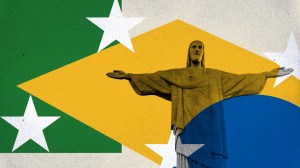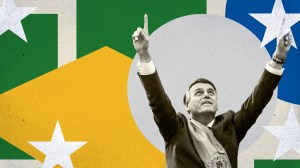In this series

How does Bolsonaro approach evangelicals compared to previous presidents?
Guilherme De Carvalho: Bolsonaro has openly identified himself as a representative of evangelicals, making it the first time a presidency has not treated evangelicals as “others.” And he has managed to do this even without being evangelical. His success illuminates a problem that I have pointed out for some time: Our cultural elites have not yet granted Brazilian citizenship to the evangelical movement.
Iza Vicente: Bolsonaro has achieved what many religious leaders have never achieved: uniting various evangelical segments from the most diverse denominations and traditions. Such union happened not because of unity in Christ but because of the fear Bolsonarista propaganda fostered in the evangelical environment and because of the thirst for power and recognition of most evangelical leaders. Even as the evangelical community continues to grow numerically and the movement has begun to form its own voting bloc—both of these things happening without any kind of systematic persecution—Bolsonaro has used fallacies and vacuous speeches to indicate that societal changes involving the civil rights of minorities would hurt the values that evangelicals hold dear and that having a supposedly Christian president would mitigate these effects.
Ziel Machado: Bolsonaro has more ties to the evangelical community. His wife is evangelical, and an evangelical pastor officiated their marriage. Thus, his ties to evangelicals predate his political ties. They are bonds of friendship, of someone who sympathizes with and identifies with Christian values. So it’s not just a political strategy. It has become a political strategy, but these ties predate their political use.
Previous presidents did not have this same proximity to the evangelical world and have treated interactions with evangelicals like they were following a campaign strategy. By this I do not mean that this attitude is invalid or inappropriate. In fact, a straightforward political approach can be more ethical than an affective approach intertwined with murky values.
Jacira Monteiro: Bolsonaro has manipulated and co-opted Christians, offering himself as the only salvation against the Left, against the Worker’s Party (Partidos Trabalhistas or PT). He presented himself as a messiah. He took important issues for Christians, like abortion and the family, and made them the basis of his campaign. He also played (and continues to play) a two-sided game: “Either I am the president and I will free you from evil, from Satan—namely, from the PT and the Left—or Brazil returns to darkness.” All the while, his campaign employs aggressive and polarizing language.
Ricardo Barbosa: Ever since evangelicals’ numerical growth has made them a political force, politicians have sought to get closer to this group and win their votes, often visiting churches or participating in religious events.
According to data from anthropologist Juliano Spyer’s book O Povo de Deus (The Power of God), in the 1970s, evangelicals represented only 5 percent of Brazilians. Today they are a third of the adult population of the country, and they continue to grow. It seems to me that of the presidents from Fernando Henrique Cardoso (1995–2002) to Bolsonaro, Bolsonaro has best identified himself with a significant portion of Christians (evangelicals and Catholics) through his language and by defending values like the traditional family and patriotism and opposing gender ideologies. A large part of the Brazilian Christian electorate care deeply about these same values.
Read our guests’ bio in the lead article.




















